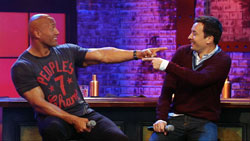I spent a lot of my free time this year watching the United States struggle greatly with a push for social justice. As far as civil rights go, our country’s division has reached a level we haven’t seen since the 1960s.
In August 1968, many left-wing activist groups gathered in Chicago to protest the ever-increasingly unpopular Vietnam War, planning to disrupt the Democratic National Convention, which was set to nominate the also unpopular Hubert Humphrey to take on Richard Nixon. For days, members of the Youth International Party (yippies), Students for a Democratic Society (SDS), National Mobilization Committee to End the War in Vietnam (Mobe), and other groups opposing the Vietnam War gathered en masse to peacefully protest. On Aug. 28, a police-incited riot broke out, and, after over 600 protestors and unaffiliated civilians were beaten and gassed by heavily armed members of the Chicago Police Department and Illinois National Guard, eight leaders from these anti-war groups were arrested and tried for inciting a riot.
Released on Netflix in September, Aaron Sorkin’s The Trial of The Chicago 7 begins with an upbeat and almost funky montage that progresses from clips of draft letters in mailboxes to the assassinations of Martin Luther King Jr. and Malcolm X to an introduction of the movie’s cast; and a large cast it is. The Chicago Seven themselves are: Tom Hayden and Rennie Davis, members of the SDS; Jerry Rubin and Abbie Hoffman, leaders of the yippies; David Dellinger, leader of the Mobe; and John Froines and Lee Weiner, who were called “givebacks” in the film—meaning they were tried so the jury could “give them back” after convicting the others.
Bobby Seale, leader of the Black Panther Party, was also a defendant; one who was disenchanted with being associated with the riots, as he was only in Chicago for four hours on Aug. 28. Played by up-and-comer Yahya Abdul-Mateen II, Bobby Seale’s fiery conduct in an unfair courtroom gave me goosebumps on multiple occasions; every time Judge Julius Hoffman (Frank Langella) handed down a contempt of court charge (and he did this a few times), I cringed. When he was bound, gagged, and treated like a beast for voicing his dissatisfaction, I nearly bit my tongue at the fact that this happened just some 50 years ago.
However, I think that’s the point of Abdul-Mateen’s performance: to elicit a response of shock and disappointment at injustice. We instinctively don’t like to hear a judge tell court officers to take a black man into a room and “see to it that he’s dealt with.” Though a relatively small part of the 130-minute film, going into awards season, I can’t help but have a feeling his supporting role will be acknowledged.
Just as Abdul-Mateen’s performance intentionally got my unconditional sympathy, Langella’s turn as the very real villain Judge Julius Hoffman (no relation to defendant Abbie Hoffman) was highly thought-provoking in the other direction, as it were. Langella’s subtlety in weaving together harsh adjudication and the onset of senility is a really great combination that he pulls off really well. In that sense he also becomes an excellent proxy for many unqualified law professionals that unfortunately plague our system to this day; I would be remiss if I glossed over the fact that, as Sacha Baron Cohen’s Abbie Hoffman said multiple times, this was indeed a political trial.
Although the actual events that took place involved all seven of these men, much of the film revolved around the specific case of Tom Hayden, played by Eddie Redmayne. I’ve always found Redmayne to be charming, if not a little bland, which is solid but leaves a sort of excitement to be desired.
In The Chicago 7, Redmayne kept his boyish, Hugh Grant-like charm but put it fully toward playing Hayden. This time, though, I felt different about Redmayne. He brought Sorkin’s interpretation of Tom Hayden to life in a way that was genuinely exciting, despite the whole movie essentially taking place inside the courtroom. It’s difficult not to get emotionally riled up and invested in the cause when Redmayne screams into the crowd that “if blood is gonna flow, let it flow all over the city;” his charm and passion really come off as authentic, and it captivated me in a way he never has before. This is perhaps my favorite performance of his, hands-down.
None of these performances would be worth talking about, though, save for Aaron Sorkin’s masterful script. Sorkin is well-known in the top tier of screenwriters, especially when it comes to legal dramas. With a robust body of work including The West Wing, Newsroom, A Few Good Men, Moneyball, and plenty others, Sorkin’s script was not lacking. As for how that writing translates into acting, I think Sacha Baron Cohen’s interpretation of comedian and yippie leader Abbie Hoffman is a great example.
In this nonlinear story, flashbacks are interspersed throughout the court scenes. A few of these flashbacks exist as Cohen doing standup in character as Hoffman, and this juxtaposition of comedy inside a strict drama actually serves to simulate how many actually learned about the trial and riot themselves. Cohen’s droll performance in a relatively serious film brightened up Sorkin’s strong story even more.
The technical art side of The Trial of The Chicago 7 isn’t necessarily a phenomenon by any means, but there are no shortage of talented people working on the wardrobe for this ‘60s period piece. Whoever was in the fake blood department had a good amount of work ahead of them and deserves a commendation for supplying fake blood for some 500 extras playing injured protestors. The score, by Daniel Pemberton, was somewhat generic for a courtroom drama—think Law & Order—but not inadequate by any means.
One technical aspect I think was nailed, though, was the work by Greek cinematographer Phedon Papamichael. He channeled very well the feeling of the 1960s and the camerawork really shone, especially in outdoors nighttime scenes; he made an impromptu protest concert precipitating the riot look and feel like an intimate Woodstock, and in turn built on top of the suspense element leading up to that riot scene.
It can’t be emphasized enough how important it is that The Trial of The Chicago 7 came out in 2020. In the past year, we’ve become all too familiar with peaceful protests being met with police violence. As one of the most prominent and famous cases of this phenomenon, the Chicago Seven trial is a sobering reminder that the fight for civil justice didn’t end in the Civil Rights era, nor is it over now. At four out of five stars, Aaron Sorkin’s film uses yesterday’s history to hammer home just how important justice is today.
IMAGE TAKEN from ThePlaylist.net



